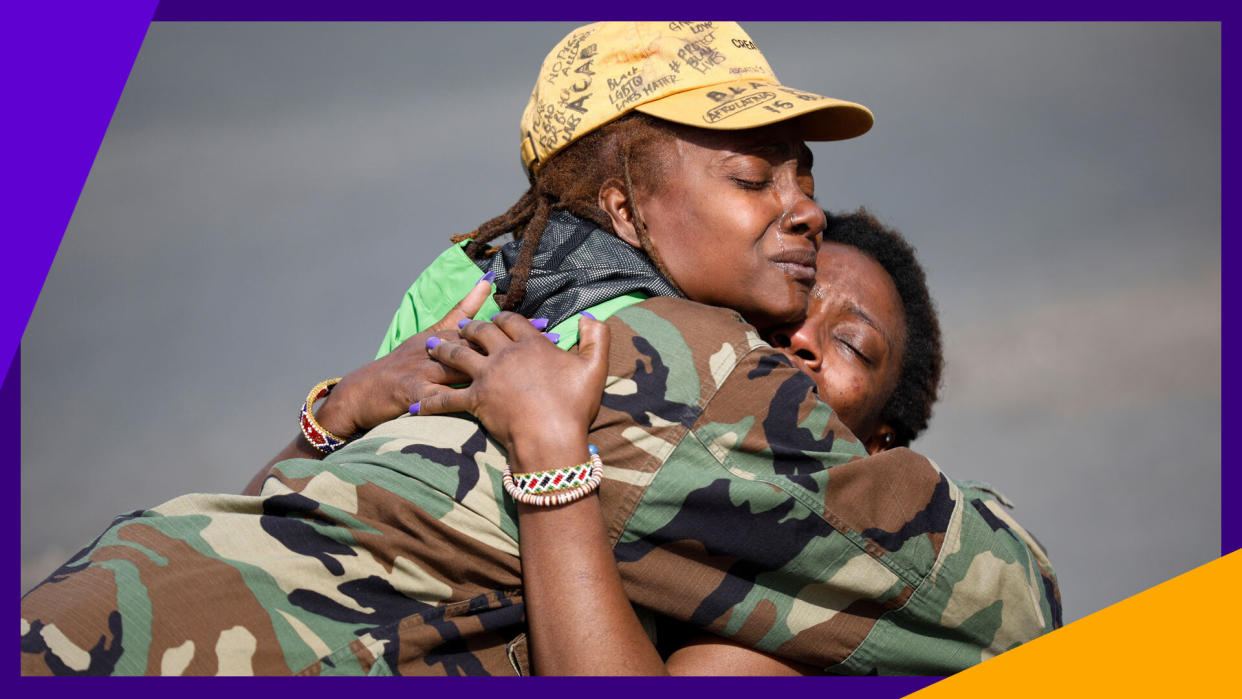Black Americans face stigma around therapy, but mental health advocates are shifting the narrative: from ‘a last resort’ to ‘maintenance of ourselves’

The stigma of mental health care in the Black community, compounded with the reality of being Black in America, is a dangerous combination. From systemic racism to the trauma of constantly witnessing violence against and killings of Black people by the police, being able to address and maintain mental health is especially important for Black Americans.
According to the U.S. Department of Health and Human Services, Black Americans report feelings of sadness, hopelessness, worthlessness, or that everything is an effort, all or most of the time, more often than white Americans. Similarly, the Anxiety and Depression Association of America reported that Black Americans are 20 percent more likely to experience mental health issues than non-Black Americans. Despite these findings, Black patients are less likely to use mental health resources.
There are a number of factors to consider when looking at these numbers — one of which is the stigma surrounding mental health care. A study conducted for the National Institute of Health found that 63 percent of Black people believe that a mental health condition is a sign of personal weakness.
“There has been a large spike in suicides amongst Black men during the era of Black Lives Matter,” Allissa Richardson, author of Bearing Witness While Black: African Americans, Smartphones and the New Protest #Journalism and assistant professor of journalism at USC Annenberg School for Communication and Journalism, tells Yahoo Life. “Teenage boys are especially vulnerable to this rise. They are growing up seeing images of Trayvon Martin and Mike Brown lying in pools of their own blood. Videos of Eric Garner and George Floyd being choked to death. There is a lot of trauma in bearing witness while Black.”
Richardson adds that “African Americans also report high levels of anxiety, nightmares, and even post-traumatic stress disorder after being exposed to a succession of fatal police encounters — especially if it triggers a real-life memory of a racist incident.”
Leon Ford, an activist, author and public speaker who survived a police shooting in 2012, tells Yahoo Life, “I mentor families of individuals who have been shot by police, and I just offer my lived experience as a resource to people who've gone through this because it's a very complicated experience. Especially from a mental health perspective of just living through the trauma, trying to cope with the trauma, but also the exploitation of the trauma.”
Ford went on to say, “I encourage people to seek therapy because mental health plays a huge role in how we solve problems. And what I realized is that a lot of activists are severely traumatized and they're experiencing burnout.”
Hannah Tall, director of programs for The Loveland Foundation, agrees about the importance of therapy, telling Yahoo Life: “As it pertains to the stigma, our founder, Rachel Cargle, put it beautifully when she stated, ‘We're hoping that the Therapy Fund completely shifts our understanding of what therapy is. That we begin to understand it as more of a maintenance of ourselves, as opposed to a last resort, rock bottom situation.’”
In addition to the stigma of going to therapy, Black people often face added barriers when it comes to accessing mental health care — one of which is being underinsured or without insurance. In 2018, more than 11 percent of Black adults in the U.S. were without health insurance. Tall spoke of some of the other barriers, which include “distrust in the health care system, inadequate support for mental health service in safety net settings (uninsured, Medicaid, etc.), and lack of diversity among mental health care providers and lack of culturally competent providers.”
Less than 2 percent of American Psychological Association members are Black, which may leave some wondering whether they’ll be understood by the mental health practitioners they do have access to.
Tall explains that therapy, however, is only one aspect of mental health care and that the Loveland Foundation approaches wellness “holistically.” Tall says, “Therapy is part of a larger wellness toolbox, and we encourage folks to find additional tools that may support their mental, physical, spiritual, emotional wellbeing.”
For some, “that may look like working out, still or movement-based meditation, art, etc.,” Tall says. “But it's really important that folks remember to be patient with themselves as they work to find the tools that can be most supportive to them in their mental health and overall wellness practice.”
If you or someone you know is having suicidal thoughts, don’t hesitate to reach out for help. The National Suicide Prevention Lifeline is open 24 hours a day at 800-273-8255.
YAHOO ALLYSHIP PLEDGE: WHAT YOU CAN DO
The following organizations provide therapy and raise awareness about mental health:
Mental Health America is a community based non-profit working to address the needs of those living with mental illness, and to promote the overall mental health of all. This link defines racial trauma as a mental health issue, and offers a wealth of resources where people from different backgrounds can reach out for support.
The Leon Self Care Handbook: From Surviving to Thrivingwas created by author and police shooting survivor Leon Ford to support community well-being. It is available for free download.
The American Psychological Association provides statistics on the current state of mental health in the Black community
Read more from Yahoo Life:



